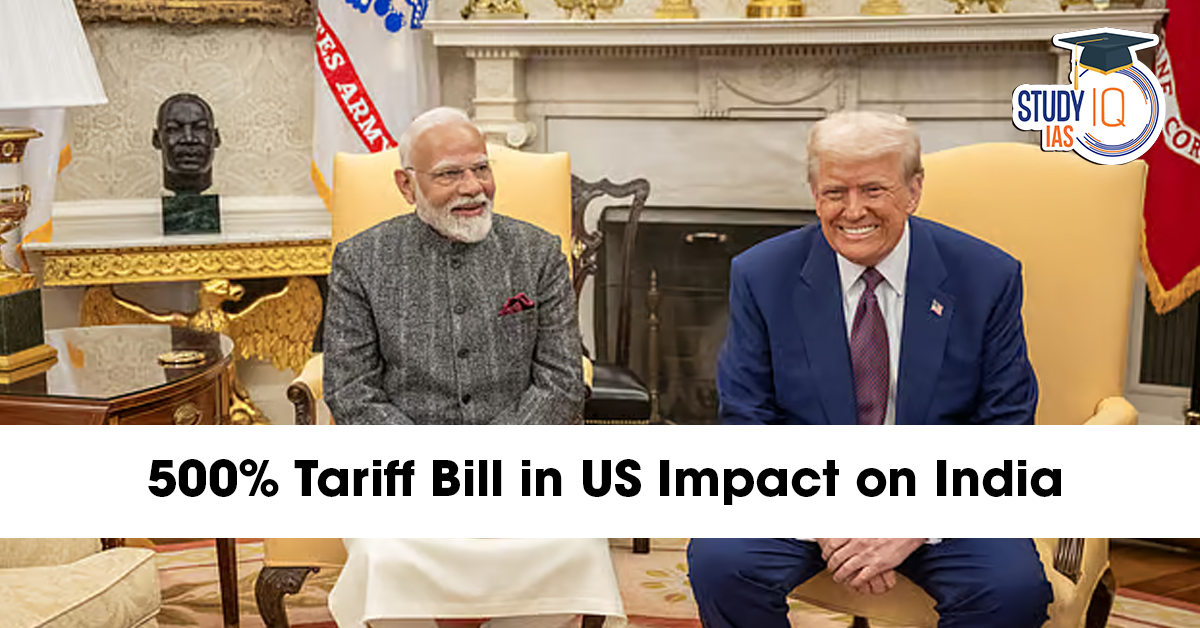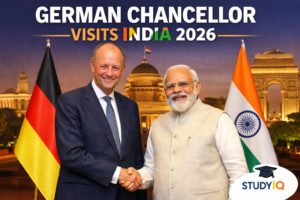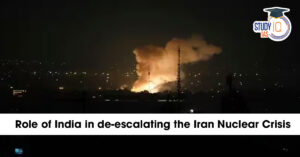Table of Contents
Context: US Senator Lindsey Graham is set to propose legislation that would impose a 500% tariff on US imports from countries that maintain trade relations with Russia.
500% Tariff Bill in US
A U.S. Senate bill, supported by President Trump and introduced by Senator Lindsey Graham, aims to apply a 500% tariff on imports from nations—such as India and China—that keep buying Russian crude oil. This is an attempt to economically sanction Russia and apply pressure on it during the Ukraine crisis
Impacts of the Proposed US Bill on India
- Threat to Indian Exports: Indian goods exported to the US could become uncompetitive if subjected to a 500% tariff, severely affecting sectors like pharmaceuticals, textiles, gems & jewellery, and IT services.
- Disruption of Supply Chains: Indian businesses reliant on exports to the US may face contract losses, reduced orders, and supply chain disruptions.
- Potential Retaliation: India might be forced to consider counter-measures or diversify its export markets.
- Strain Relations: India’s longstanding policy of balancing relations between the US and Russia will be severely tested, possibly leading to friction with either or both countries.
- Defence & Energy Security: Since India relies on Russia for critical defence hardware and energy imports, any reduction in ties could impact national security.
- Internal Divisions: The issue could fuel debate within India among pro-Russia (Russophiles) and pragmatic (Russoskeptic) camps, impacting policy decisions and public opinion.
- Economic Costs: Industries dependent on Russia for cheap oil or defense equipment may lobby to maintain ties, while export-driven sectors may push for realignment with US interests.
- China Factor: Weakening ties with Russia could push Moscow closer to China and possibly Pakistan, altering the strategic landscape in Asia to India’s disadvantage.
- Pressure on Strategic Autonomy: India’s pursuit of an independent foreign policy (“strategic autonomy”) could come under strain, impacting its global diplomatic leverage.
- International Perception: India’s stance on the Russia-Ukraine conflict will be under global scrutiny, affecting its reputation as a neutral, balancing power.
- Risk of Economic Isolation: If multiple countries join the US in imposing similar measures, India could face broader economic challenges.
Way Forward
- Intensify Diplomatic Engagements: Proactively engage with both the US and Russia to explain India’s position, seek exemptions, and highlight the need for a pragmatic, multi-aligned foreign policy.
- Diversify Trade & Energy Sources: Accelerate efforts to diversify India’s export markets and reduce overdependence on any single country for critical imports such as energy and defense equipment.
- Strategic Policy Balancing: Maintain a careful balance in relationships, ensuring neither the US nor Russia feels alienated, while safeguarding India’s strategic and security interests.
- Strengthen Domestic Manufacturing: Invest in domestic capacity-building for defence and energy to reduce vulnerabilities stemming from external pressures or supply chain disruptions.
- Multilateral Collaboration: Work with other major economies and multilateral forums to build consensus on avoiding unilateral sanctions, promoting dialogue over punitive economic measures.


 German Chancellor Visit to India in 2026...
German Chancellor Visit to India in 2026...
 Iran Nuclear Crisis and India’s Role f...
Iran Nuclear Crisis and India’s Role f...
 H1B Visa Program, Beneficiaries, Eligibi...
H1B Visa Program, Beneficiaries, Eligibi...




















